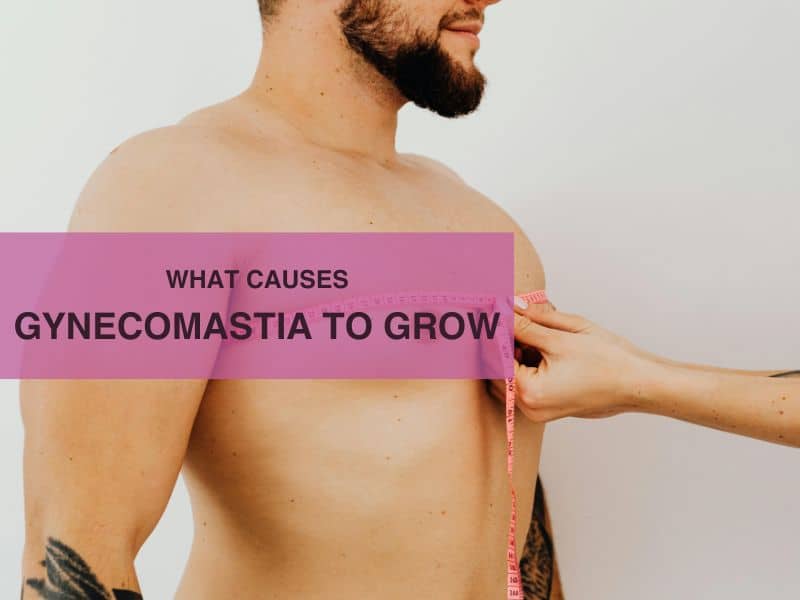Is Gynecomastia Genetic?
Written by: Dr. Dahlia Rice. Posted in: Blog

As a man currently struggling with gynecomastia, it’s natural to be curious about the causes of this condition. Before diving into this topic full force, however, it’s important to first mention that gynecomastia, or the enlargement of male breast tissue, is a common condition that many experience at different life stages. It’s nothing to be embarrassed about. Though it’s certainly understandable if you desire treatment to fix it.
With that said, there are a range of causes of this condition. A common question we receive, is: “Is gynecomastia genetic?” The short answer is: Sometimes.
In the following article, we’ll answer this question and explore all of the core causes of gynecomastia.
Table of Contents
ToggleIs Gynecomastia Genetic?
With gynecomastia genetic causes can be the root of the problem, but this isn’t always the case. For instance, Klinefelter syndrome, a genetic condition where males have an extra X chromosome, is a known cause of gynecomastia.
However, just because a family member, like your father or grandfather, had gynecomastia doesn’t necessarily mean you will develop genetic gynecomastia yourself. Various factors, both genetic and environmental, play a role in its development. In most cases, gynecomastia (enlarged glandular breast tissue) results from hormonal imbalances or external influences rather than direct inheritance.
Most Common Causes of Gynecomastia
While pubertal gynecomastia is simply a symptom that many males temporarily experience as they go through puberty, most gynecomastia in adults is caused by one or more of the following.
Hormonal Imbalance
An imbalance between estrogen and testosterone levels is a primary cause of gynecomastia. When estrogen levels are too high (estrogen excess) or testosterone levels are too low, breast tissue can enlarge.
This imbalance can occur naturally during puberty or as men age. The estrogen receptors or androgen receptors can be imbalanced or testosterone synthesis is off. Sometimes, doctors know the condition is hormone-related, but you will still be diagnosed with idiopathic gynecomastia.
 Use of Certain Medications
Use of Certain Medications
Some medications or medical treatments, such as androgen deprivation therapy, can lead to gynecomastia. Drugs such as anti-androgens used for prostate cancer treatment, certain antidepressants, and medications for heart conditions have been linked to the development of enlarged male breast tissue.
Drug and Alcohol Use
Substances like alcohol, marijuana, and anabolic steroids can contribute to gynecomastia. These substances can disrupt hormonal balance, leading to the enlargement of breast tissue in men.
Excessive alcohol consumption, in particular, can damage liver function, impairing the body’s ability to regulate hormones effectively. Anabolic steroids, commonly used for muscle growth, can increase estrogen levels and lead to breast tissue development.
Serious Medical Conditions
Certain health conditions can cause chronic gynecomastia. For example, liver disease can interfere with hormone metabolism, leading to elevated estrogen levels.
Additionally, testicular tumors affecting hormone-producing glands, such as the pituitary gland or testicles, can result in breast tissue growth. Kidney disease, advanced prostate cancer, androgen insensitivity syndromes, and thyroid disorders are also linked to hormonal imbalances that may cause gynecomastia.
Lifestyle Factors
Carrying excess body fat can lead to increased estrogen production, which may cause breast enlargement. This is sometimes referred to as pseudo-gynecomastia, where fat accumulation mimics true gynecomastia. Maintaining a healthy weight through diet and exercise can help prevent gynecomastia related to obesity.
Genetics
While not typically the sole cause, gynecomastia genetic causes have certainly been documented. Conditions like Klinefelter syndrome are directly linked to genetic factors. However, the majority of gynecomastia cases are due to a combination of genetic predisposition and other influences.
Severity of Gynecomastia
There are four main gynecomastia stages (grades).
Grade I
This is the mildest form, characterized by a small amount of breast enlargement without excess skin. The enlargement is typically localized around the nipple area. Treatment may include observation or medical therapy to address hormonal imbalances.
Grade IIA
In this stage, there is moderate breast enlargement without excess skin. The breast tissue extends beyond the areola but doesn’t sag. Treatment options may involve medical therapy or minimally invasive procedures.
Grade IIB
This grade involves moderate breast enlargement with excess skin. The breast begins to sag due to the increased tissue and skin. Surgical intervention, such as male breast reduction, is often considered to remove excess tissue and skin.
Grade III
The most severe form, characterized by significant breast enlargement with substantial excess skin and noticeable sagging. Surgical treatment is typically recommended to remove the excess breast tissue and correct the sagging.
FAQs: Gynecomastia
 Can gynecomastia occur in one or both breasts?
Can gynecomastia occur in one or both breasts?
Yes, gynecomastia can affect one or both breasts. The enlargement may be symmetrical or asymmetrical, depending on the individual case. Some men experience noticeable differences between their breasts, which can be more pronounced in cases of hormonal imbalance or medication-induced gynecomastia.
Is gynecomastia linked to male breast cancer?
While gynecomastia itself is benign, having it doesn’t significantly increase the risk of male breast cancer. However, any unusual changes in breast tissue, such as lumps, nipple discharge, or persistent pain, should be evaluated by a healthcare professional. Male breast cancer is rare but should not be overlooked if concerning symptoms develop.
How long is the gynecomastia surgery recovery time?
Gynecomastia surgery recovery time varies, but most individuals can return to normal activities within a few weeks after surgery. Compression garments are often recommended to help with swelling and contouring. Strenuous activity should be avoided for several weeks in most cases.
Call Today to Schedule a Consultation
Gynecomastia can be both physically and emotionally uncomfortable for many men. If you are struggling with this condition, it’s important to find a qualified gynecomastia surgeon you can trust to perform gynecomastia surgery.
Board-certified plastic surgeon Dr. Dahlia Rice would be happy to meet with you to discuss possible causes of gynecomastia and the best medical treatment to correct your specific case of this condition. To learn more and book your consultation, please contact our office today.
 Use of Certain Medications
Use of Certain Medications Can gynecomastia occur in one or both breasts?
Can gynecomastia occur in one or both breasts?